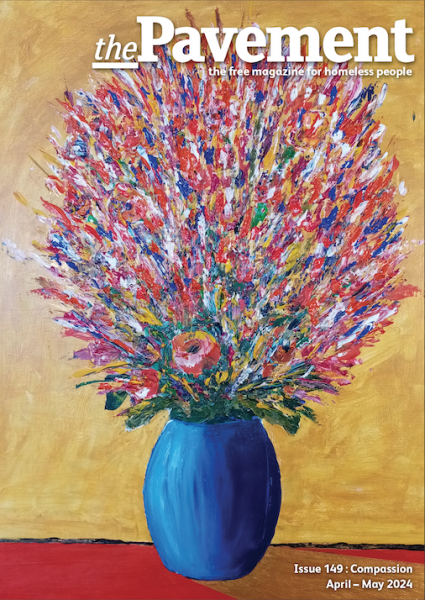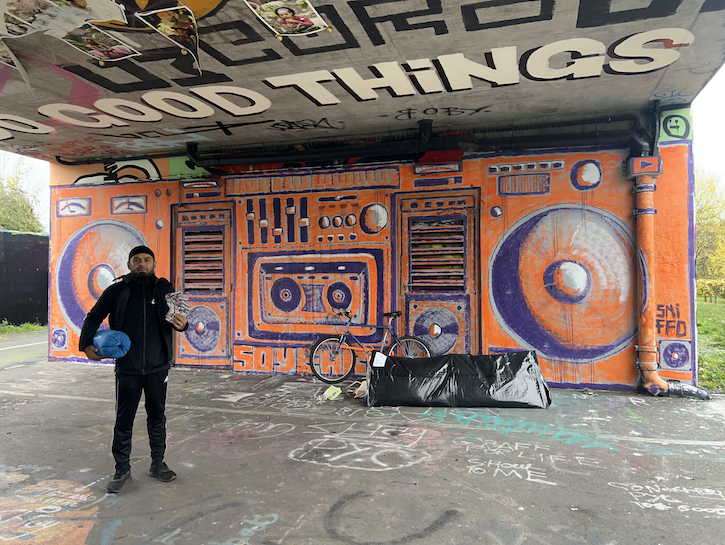
Established 2005 Registered Charity No. 1110656
Scottish Charity Register No. SC043760
DONATE
RECENT TWEETS
How the little things we do to support people experiencing homelessness can lead to big changes for the better. Words on outreach, attitudes and fighting divisive rhetoric, by Emdad Rahman
The little things in our lives do matter a great deal, be it a flask of hot tea, a slice of cake, or the gift of a hat or scarf.
Homeless outreach teams the length and breadth of the UK will never eradicate homelessness without greater support and a clear strategy from our leaders, but they do what they can to shed light on an issue which is becoming increasingly visible and urgent in the public’s mind.
For this reason, charities and volunteers will go out to share small items of value: flashlights, supplements, toiletries and protective covers with a view to alleviating the suffering of people faced with a life on the streets.
A tent has magical powers – it protects its inhabitant from the elements and abusive actions of fellow humans. It offers privacy, dignity and a relatively safe space.
The words of irresponsible leaders have far-ranging consequences and homeless people have faced distress with their circumstances despicably described as “lifestyle choices.”
Rough sleeping is the most visible and dangerous form of homelessness and any person with any sense of reality will be fully aware that living on the streets is anything but a chosen path.
People sleeping rough face great danger, theft, assaults, rape and for personal safety reasons many will stay awake during the night, travelling on night buses, walking public streets and public toilets. The reason for this is that visibility usually means safety.
One individual who I was able to talk to about these developments is an old acquaintance of mine. Lea (not her real name) and I used to link up weekly on an allotment as part of a mental health wellbeing activity.
Her health has declined over the years due to the trauma she has experienced.
Lea’s meticulous nature manifests itself even in the way she lives on the streets. After having her tent destroyed by a group of rowdy drunks on a night out, she trawled the local estates and got herself an outdoor bed together with sheeting. When I saw her last during a Bookbike run I saw her dousing the flames after her bed was set on fire.
The cost-of-living crisis, along with a significant shortage of affordable housing and insufficient funding for homelessness services, means the number of people sleeping rough has increased sharply.
One friend I regularly meet on my travels sleeps in the garages of a well-known restaurant and he says he is lucky to have remained undetected so far. This is the reality of life on the street.
For many years his declining mental health has led to a life sleeping rough on the streets. I was astonished to be told he was unable, for various reasons, to access healthcare. Happily, I was able to instantly introduce him to the Homeless Health Inequality Clinic, operating in Barking, and ShowerBox London (free showers available every Saturday outside St Giles-in-the-Fields, central London, 10am–4pm).
A winter outreach programme has enabled me to share copies of the Pavement with many facing life on the streets and each copy has been a valuable resource to the recipient, with many able to access vital support as a result of the compendium of useful information contained within each copy.
Absolutely no one should be deprived of warmth, safety and security and the lesson learnt is that the little things matter a great deal. Our words and conduct when it comes to interaction with vulnerable people can have far-reaching and detrimental consequences.
The Mayor of London, Sadiq Khan, has launched the first ever London Rough Sleeping Charter which is bringing communities, charities and businesses together to promote a shared belief that any person spending a night alone in a supermarket, a park, a car or a stairwell is not there by chance – there are circumstances like benefit cuts, abuse, a mental health breakdown or the cost-of-living crisis which has greatly contributed to the situation.
The person on the street we feel sorry for has aspirations and hopes and deserves dignity and a helping hand. Refusing to be influenced by divisive rhetoric is one of the most powerful tools we have to beat homelessness.
- Emdad is on Twitter/X: @emdad07
April – May 2024 : Compassion
CONTENTS
BACK ISSUES
- Issue 149 : April – May 2024 : Compassion
- Issue 148 : February – March 2024 : The little things
- Issue 147 : December 2023 – January 2024 : Next steps
- Issue 146 : October 2023 – November 2023 : Kind acts
- Issue 145 : August 2023 – September 2023 : Mental health
- Issue 144 : June 2023 – July 2023 : Community
- Issue 143 : April 2023 - May 2023 : Hope springs
- Issue 142 : February 2023 - March 2023 : New Beginnings
- Issue 141 : December 2022 - January 2023 : Winter Homeless
- Issue 140 : October - November 2022 : Resolve
- Issue 139 : August - September 2022 : Creativity
- Issue 138 : June - July 2022 : Practical advice
- Issue 137 : April - May 2022 : Connection
- Issue 136 : February - March 2022 : RESPECT
- Issue 135 : Dec 2021 - Jan 2022 : OPPORTUNITY
- Issue 134 : September-October 2021 : Losses and gains
- Issue 133 : July-August 2021 : Know Your Rights
- Issue 132 : May-June 2021 : Access to Healthcare
- Issue 131 : Mar-Apr 2021 : SOLUTIONS
- Issue 130 : Jan-Feb 2021 : CHANGE
- Issue 129 : Nov-Dec 2020 : UNBELIEVABLE
- Issue 128 : Sep-Oct 2020 : COPING
- Issue 127 : Jul-Aug 2020 : HOPE
- Issue 126 : Health & Wellbeing in a Crisis
- Issue 125 : Mar-Apr 2020 : MOVING ON
- Issue 124 : Jan-Feb 2020 : STREET FOOD
- Issue 123 : Nov-Dec 2019 : HOSTELS
- Issue 122 : Sep 2019 : DEATH ON THE STREETS
- Issue 121 : July-Aug 2019 : INVISIBLE YOUTH
- Issue 120 : May-June 2019 : RECOVERY
- Issue 119 : Mar-Apr 2019 : WELLBEING
- Issue 118 : Jan-Feb 2019 : WORKING HOMELESS
- Issue 117 : Nov-Dec 2018 : HER STORY
- Issue 116 : Sept-Oct 2018 : TOILET TALK
- Issue 115 : July-Aug 2018 : HIDDEN HOMELESS
- Issue 114 : May-Jun 2018 : REBUILD YOUR LIFE
- Issue 113 : Mar–Apr 2018 : REMEMBRANCE
- Issue 112 : Jan-Feb 2018
- Issue 111 : Nov-Dec 2017
- Issue 110 : Sept-Oct 2017
- Issue 109 : July-Aug 2017
- Issue 108 : Apr-May 2017
- Issue 107 : Feb-Mar 2017
- Issue 106 : Dec 2016 - Jan 2017
- Issue 105 : Oct-Nov 2016
- Issue 104 : Aug-Sept 2016
- Issue 103 : May-June 2016
- Issue 102 : Mar-Apr 2016
- Issue 101 : Jan-Feb 2016
- Issue 100 : Nov-Dec 2015
- Issue 99 : Sept-Oct 2015
- Issue 98 : July-Aug 2015
- Issue 97 : May-Jun 2015
- Issue 96 : April 2015 [Mini Issue]
- Issue 95 : March 2015
- Issue 94 : February 2015
- Issue 93 : December 2014
- Issue 92 : November 2014
- Issue 91 : October 2014
- Issue 90 : September 2014
- Issue 89 : July 2014
- Issue 88 : June 2014
- Issue 87 : May 2014
- Issue 86 : April 2014
- Issue 85 : March 2014
- Issue 84 : February 2014
- Issue 83 : December 2013
- Issue 82 : November 2013
- Issue 81 : October 2013
- Issue 80 : September 2013
- Issue 79 : June 2013
- Issue 78 : 78
- Issue 77 : 77
- Issue 76 : 76
- Issue 75 : 75
- Issue 74 : 74
- Issue 73 : 73
- Issue 72 : 72
- Issue 71 : 71
- Issue 70 : 70
- Issue 69 : 69
- Issue 68 : 68
- Issue 67 : 67
- Issue 66 : 66
- Issue 65 : 65
- Issue 64 : 64
- Issue 63 : 63
- Issue 62 : 62
- Issue 61 : 61
- Issue 60 : 60
- Issue 59 : 59
- Issue 58 : 58
- Issue 57 : 57
- Issue 56 : 56
- Issue 56 : 56
- Issue 55 : 55
- Issue 54 : 54
- Issue 53 : 53
- Issue 52 : 52
- Issue 51 : 51
- Issue 50 : 50
- Issue 49 : 49
- Issue 48 : 48
- Issue 47 : 47
- Issue 46 : 46
- Issue 45 : 45
- Issue 44 : 44
- Issue 43 : 43
- Issue 42 : 42
- Issue 5 : 05
- Issue 4 : 04
- Issue 2 : 02
- Issue 1 : 01
- Issue 41 : 41
- Issue 40 : 40
- Issue 39 : 39
- Issue 38 : 38
- Issue 37 : 37
- Issue 36 : 36
- Issue 35 : 35
- Issue 34 : 34
- Issue 33 : 33
- Issue 10 : 10
- Issue 9 : 09
- Issue 6 : 06
- Issue 3 : 03
- Issue 32 : 32
- Issue 31 : 31
- Issue 30 : 30
- Issue 29 : 29
- Issue 11 : 11
- Issue 12 : 12
- Issue 13 : 13
- Issue 14 : 14
- Issue 15 : 15
- Issue 16 : 16
- Issue 17 : 17
- Issue 18 : 18
- Issue 19 : 19
- Issue 20 : 20
- Issue 21 : 21
- Issue 22 : 22
- Issue 23 : 23
- Issue 24 : 24
- Issue 25 : 25
- Issue 8 : 08
- Issue 7 : 07
- Issue 26 : 26
- Issue 27 : 27
- Issue 28 : 28
- Issue 1 : 01

